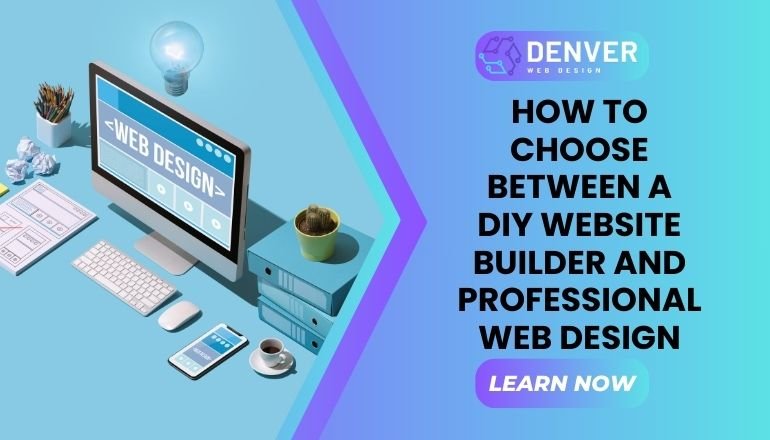
When it comes to building a website, one of the first decisions you’ll face is whether to use a DIY website builder or hire a professional web design service. Both options have their benefits, but the right choice depends on your business needs, budget, and long-term goals.
In this article, we’ll explore the differences between these two approaches, helping you decide which path is best for your website’s success.
What is a DIY Website Builder vs. Professional Web Design?
A DIY website builder is an online tool that allows users to create a website without coding knowledge. Popular platforms like Wix, Squarespace, and WordPress offer drag-and-drop functionality and pre-designed templates, making it easy for anyone to build a website quickly. These platforms are designed for individuals or small businesses who need a simple, budget-friendly solution to get online.
On the other hand, professional web design refers to working with a team of experienced designers and developers to create a custom website tailored to your specific needs. Professional web designers focus on creating a website that reflects your brand identity, improves user experience, and is optimized for performance and search engines. This approach typically results in a more polished and functional site that stands out in the competitive digital landscape.
Why is Choosing the Right Option Essential for Your Website?
Your website is often the first impression customers have of your business, and choosing the right design approach can significantly impact your brand’s success. If you choose a DIY website builder, you might save money upfront, but the site may not have the same functionality, customization options, or professional polish that a custom design can offer.
A professional web design ensures that your website is not only aesthetically pleasing but also optimized for SEO, user experience, and performance. A professionally designed website is more likely to rank well on search engines, have better load speeds, and offer a seamless user experience, all of which can drive more traffic and improve conversion rates. In contrast, DIY sites often lack the technical features that help businesses scale over time.
Key Features/Components of DIY Website Builders vs. Professional Web Design
DIY Website Builders:
- Ease of Use: DIY builders are designed to be intuitive and user-friendly, even for those without any technical skills.
- Pre-designed Templates: Most builders offer a variety of templates that can be customized with your branding, saving you time on design.
- Limited Customization: While you can change colors, fonts, and layouts, you may encounter limitations in design flexibility.
- Basic SEO Tools: DIY builders usually have built-in SEO tools, but these are often limited in comparison to what a professional can implement.
- Affordable: DIY website builders are often much cheaper than hiring a professional designer, making them ideal for those on a tight budget.
Professional Web Design:
- Custom Design: A professional designer will create a unique website tailored to your brand and business needs, helping you stand out from the competition.
- Advanced Functionality: Professionals can incorporate custom features like advanced animations, interactive elements, or complex e-commerce web design components.
- SEO Optimization: A professional web design will be built with SEO for websites in mind, helping you achieve higher search engine rankings and drive organic traffic.
- Responsive Design: Designers will ensure your website is fully responsive, providing a seamless experience on any device, which is essential for mobile-first design.
- Ongoing Support: Professional designers often offer maintenance services, ensuring your website stays up-to-date and functional.
Best Practices for Web Design: DIY or Professional?
Whether you opt for a DIY website builder or professional web design, it’s important to follow the best practices to ensure the success of your website.
- Focus on User Experience (UX): Prioritize user-friendly navigation, fast load times, and a clear layout to keep visitors engaged. A seamless UX will encourage repeat visitors and increase conversion rates.
- Responsive Web Design: Regardless of your choice, your website must be responsive, meaning it should adapt to different screen sizes for mobile, tablet, and desktop users.
- SEO Optimization: Ensure your website is built with SEO in mind, using keyword-rich content, clean code, and fast loading speeds to improve search engine visibility and drive more traffic.
- Clear Calls to Action (CTAs): Incorporate clear and compelling CTAs to guide users toward taking specific actions, whether it’s purchasing a product or signing up for a newsletter.
Common Mistakes to Avoid
When creating a website, whether DIY or professional, there are a few mistakes you should be careful to avoid:
- Choosing the Wrong Template or Design: DIY website builders often rely on templates that can look generic. Choose a template that aligns with your brand, or if you’re working with a professional, ensure the design is unique.
- Neglecting Mobile Optimization: In today’s digital world, mobile optimization is crucial. Ensure your website is fully responsive and works seamlessly on mobile devices to avoid losing a significant portion of traffic.
- Overcomplicating Design: While it’s tempting to add many features and elements, a cluttered website can overwhelm visitors. Stick to a clean, simple design that guides users easily toward their goals.
- Forgetting About SEO: If you’re using a DIY builder, don’t neglect SEO best practices. With a professional designer, ensure they implement proper SEO techniques to help your website rank well.
Conclusion: Key Takeaways
When deciding between a DIY website builder and professional web design, it’s important to consider your goals, budget, and long-term needs. A DIY builder may work well for a simple, low-cost solution, but if you want a customized, fully optimized website that grows with your business, investing in professional web design is the way to go.
Web Design Denver offers expert web design and development services to help businesses create unique, responsive, and SEO-optimized websites that stand out in the competitive digital marketplace. Whether you’re looking for a custom e-commerce web design or a complete website redesign, our team is here to help you build a website that aligns with your business goals.






